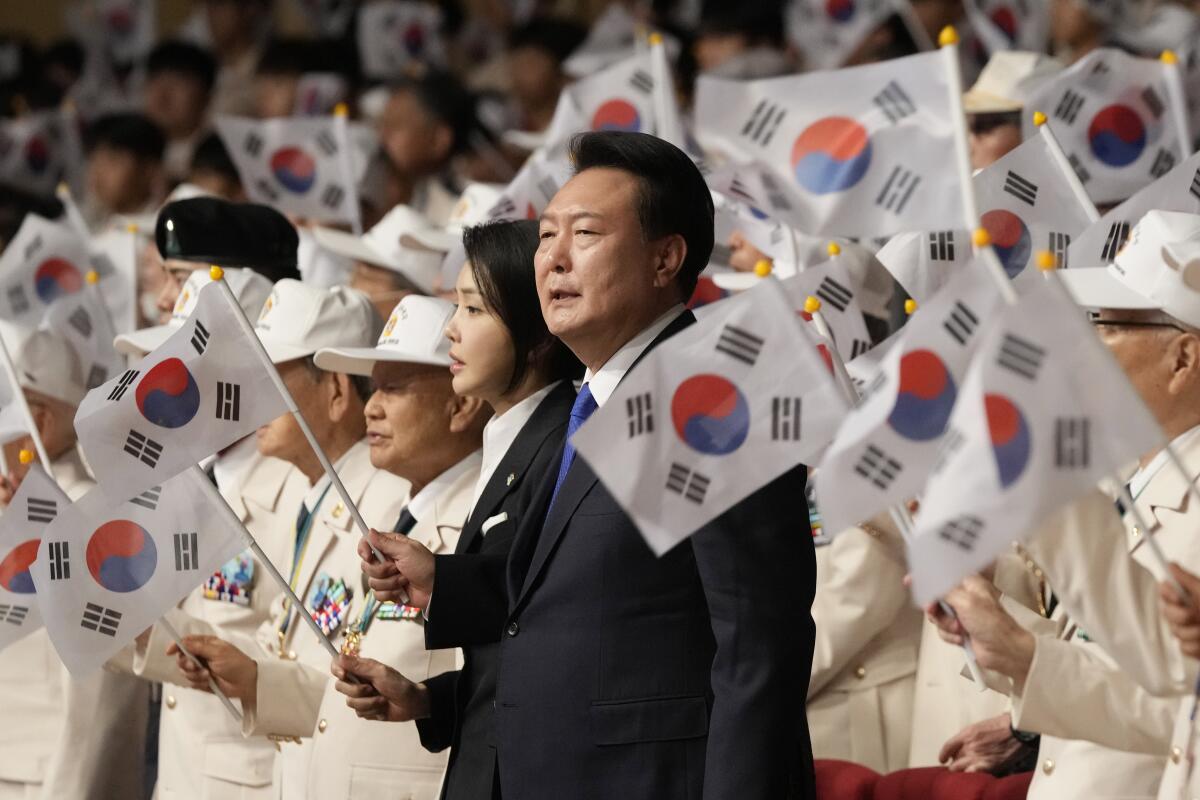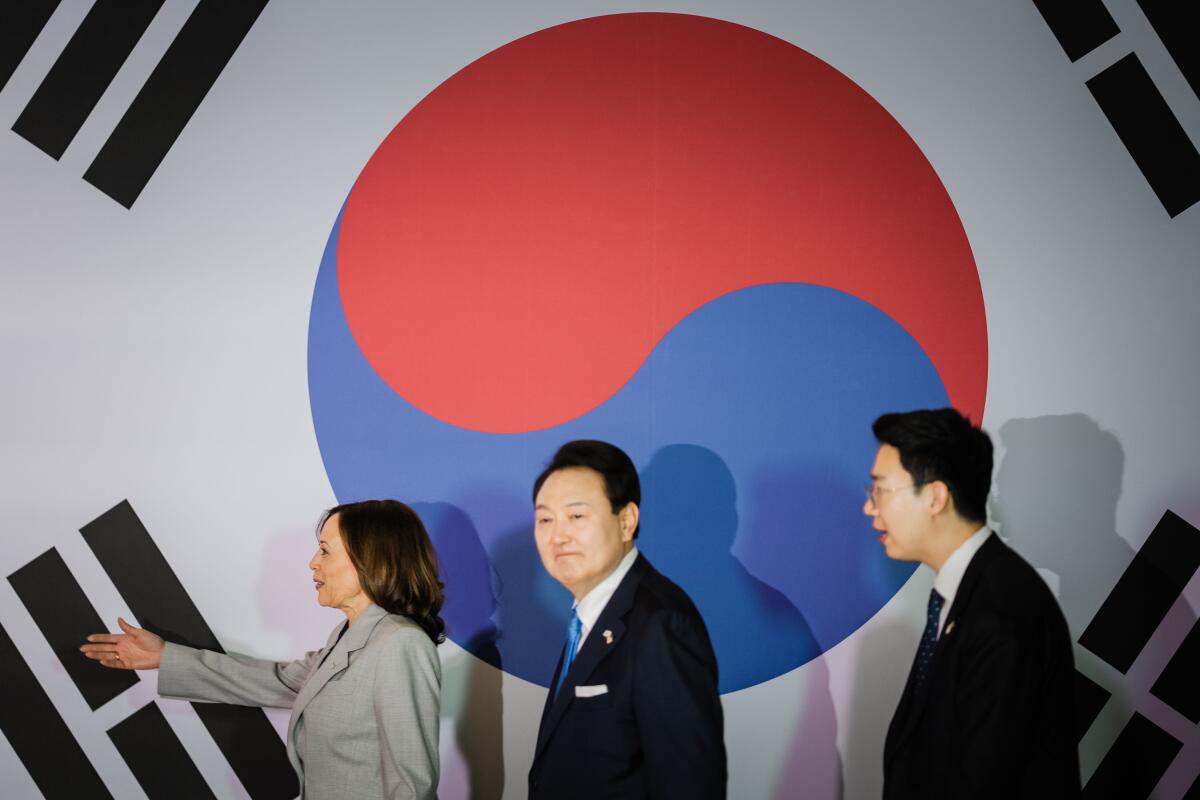Sloppy spycraft? The indictment of a former CIA analyst embarrasses South Korea
Meals at Michelin-starred restaurants. Designer handbags from Dolce & Gabbana and Louis Vuitton. More than $37,000 in cash in “covert funding” to an account that she controlled at a think tank.
These are some of the perks that Sue Mi Terry, a naturalized U.S. citizen who worked for the CIA before establishing herself as a foreign policy pundit, received in return for secretly aiding spies from South Korea, federal prosecutors alleged in a 31-page indictment unsealed last week.
Many of her alleged activities — which included helping her handlers gain access to U.S. officials and promoting talking points they gave her — were no different from those of the many foreign lobbyists working in the United States. What got her in trouble was her failure to identify herself as such with the government, as required by the Foreign Agents Registration Act.
The case, which could land Terry in prison for 10 years, has put Washington’s foreign policy world on edge.
But in South Korea, the indictment has the government and intelligence experts wondering how the country’s spies could have been so sloppy.
In a meeting with South Korean reporters, an official in the office of President Yoon Suk-yeol, a conservative, accused Yoon’s liberal predecessor of staffing the country’s National Intelligence Service with amateurs.
“This is a situation that calls for an audit or accountability measures against the Moon Jae-in administration,” the official said.
But as Yoon’s opponents have pointed out, Terry’s alleged offenses spanned a decade and aligned with three consecutive South Korean administrations, including that of Yoon, who took office in 2022.
: :
That allies spy on one another is an open secret. Scandal erupts only when indiscretions spill into public view.
Among the lesser-known revelations in the 2013 leak by Edward Snowden, the former NSA contractor, were documents suggesting that the U.S. was spying on the embassies of its allies, including South Korea.
Another controversy broke last year with a leak of classified Pentagon documents indicating the U.S. may have been eavesdropping on South Korea’s presidential office.
The aircraft carrying South Korean President Yoon Suk-yeol taxis on the tarmac on July 10, 2024, at Andrews Air Force Base, Md. Yoon was attending the NATO summit in Washington.
(Manuel Balce Ceneta / Associated Press)
In truth, most of the work that spies do in allied countries is boring, said Chae Seong-joon, a former South Korean intelligence officer.
“It’s more or less a mutually agreed exchange of personnel,” he said. “For example, CIA agents here in South Korea might publicly be listed as employees of the U.S. Embassy, but the South Korean government knows who they really are.”
Unlike spies who are sent into hostile territories with fake identities, they operate under the assumption that they are being monitored by local law enforcement at all times. As such, they spend most of their time staying abreast of local developments and gathering insights from sources in ways that won’t attract too much attention from their hosts.
Terry, 54, who has held influential positions at foreign policy think tanks and frequently wrote op-eds for U.S. publications, including the Los Angeles Times, would have been an especially attractive source.
Born in Seoul and raised in Hawaii and Virginia, she worked as an analyst for Korean affairs at the CIA from 2001 to 2008, according to her since-deleted biography at the Wilson Center, a think tank in Washington where she was employed from 2021 to 2023. She has also held senior roles at the National Security Council and National Intelligence Council.
That background gave her public credibility and access to high-level U.S. officials.
As recently as last year, the indictment alleged, Terry was writing articles at the direction of her South Korean handlers.
These include a piece published last year in Foreign Affairs that argued that the U.S. should bring in “more nuclear-capable U.S. weapons systems into South Korea, such as B-52s and F-35s,” and establish a nuclear “consultative group” — ideas that federal prosecutors say reflected the Yoon administration’s policy preferences.
In a statement, Lee Wolosky, Terry’s lawyer, said the U.S. government has made “a significant mistake.”
“The allegations are unfounded and distort the work of a scholar and news analyst known for her independence and years of service to the United States,” he said, adding that Terry has not held a security clearance for over a decade.
“In fact, she was a harsh critic of the South Korean government during times this indictment alleges that she was acting on its behalf,” the statement said.
The Council on Foreign Relations, Terry’s current employer, has placed her on unpaid administrative leave, according to her biography on its website.
: :
Terry’s desirability as a source to South Korean agents was apparent to American officials as early as 2014.
FBI agents warned her that November that South Korean intelligence officers might try to approach her. During that meeting, Terry “became visibly nervous, changed her speech pattern, and began to stutter and shift in her seat,” the indictment said.
Recruiting such an obvious source was the first mistake of the South Korean agents, said Nam Sung-wook, a North Korea expert at Korea University in Seoul and former director of the South Korean spy agency’s research arm.

South Korean President Yoon Suk-yeol, center right, and his wife, Kim Keon-hee, wave the national flags during a ceremony to mark the 74th anniversary of the outbreak of the Korean War in Daegu, South Korea, on June 25, 2024.
(Ahn Young-joon / Associated Press)
“She was someone they should have specifically avoided,” he said. “This is what happens when you send out poorly prepared agents with little English fluency: They end up trying to work only Korean-born sources who can speak Korean. Of course that’s going to draw the attention of the FBI.”
Chae, the former intelligence officer, said Terry’s handlers failed to take basic steps to cover their tracks.
In June 2022, after Terry attended a private “off-the-record” meeting that included Secretary of State Antony J. Blinken, senior State Department officials and several other Korea policy experts, a South Korean agent in a car registered to the South Korean Embassy picked her up and photographed her handwritten notes, according to the indictment.
A few weeks later, Terry hosted a happy hour for congressional staffers that was funded by the South Korean spy agency and attended by one of her handlers posing as a diplomat, the indictment says. She allegedly described the move to FBI agents as “bringing the wolf in.”
“It was extremely careless for the agent to personally attend events like that,” Chae said. “That would be considered a violation of protocol even for activities on South Korean soil.”
The indictment also includes a photograph of Terry dining with alleged South Korean spies at an “upscale Greek restaurant” in Manhattan, unaware that they are being watched, as well as a still from surveillance video showing one alleged handler purchasing a $2,950 Bottega Veneta handbag and handing it to her in a store in Washington.
South Korean intelligence officers allegedly also rewarded Terry for her cooperation with checks from the South Korean Embassy totaling $37,035 that were deposited into an “unrestricted gift account” she controlled at the Wilson Center.
The Wilson Center declined to answer questions about the account or how the money was spent.
“The Wilson Center is not a target of the investigation and has cooperated fully with law enforcement authorities,” a spokesperson said in an email.
In Washington’s foreign policy circles, Terry’s indictment is being viewed as a warning for other foreign spies and their sources in the U.S.
“It feels like authorities chose to make a public example of her case because it was especially full of mistakes on both sides,” said a former fellow at the Wilson Center who requested anonymity due to the sensitivity of the issue.
And while embarrassing for the South Korean spy agency, experts said it is unlikely to upset relations between Washington and Seoul.
“This sort of trouble is always handled through back channels,” Nam said. “The intelligence officers associated with the case will likely be called back to Seoul. The two governments will have a talk, and that will be the end of it.”

Vice President Kamala Harris and South Koean President Yoon Suk-yeol tour the NASA Goddard Space Flight Center on April 25, 2023, in Greenbelt, Md.
(Kent Nishimura/Los Angeles Times)

